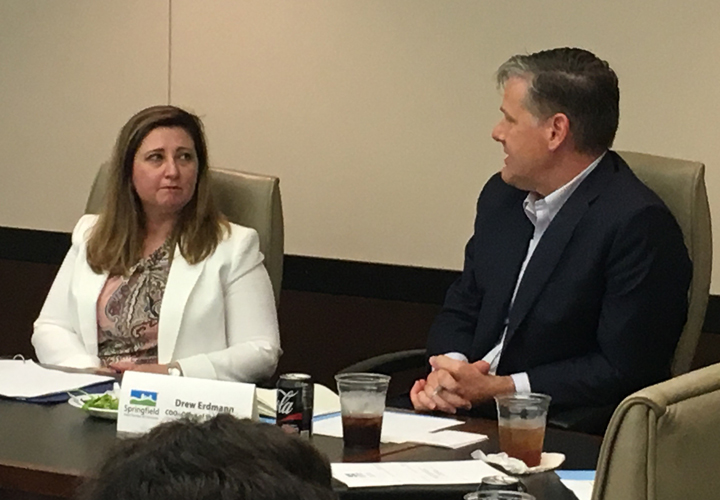State leaders echo need for workforce development

The State of Missouri faces several challenges in coming years, and few are more pressing than the ongoing shortage of skilled workers. But the state is uniquely positioned to tackle those challenges head-on if leaders are willing to take them on.
That was the message from a June 14 roundtable discussion at the Chamber between community business, education, and government leaders and two guests from Jefferson City: Drew Erdmann, chief operating officer for the office of Gov. Eric Greitens, and Zora Mulligan, the Missouri commissioner of higher education.
Mulligan offered particularly strong praise for Springfield, having grown up in West Plains where Springfield was always seen as “the big city.”
“It’s amazing to see how higher education growth has really reshaped the community,” she said. “And the square has recreated the area around it into the kind of cultural center that you need to attract entrepreneurs and an educated workforce.”
That struggle to find skilled and educated workers topped the list of challenges for both guests. Mulligan said that, among the top needs for Missouri higher education institutions, No. 1 on the list is educational attainment. “It’s not just Ph.D.s and high-level degrees,” she added. “It’s credentials and ongoing education that can be put to use in the workplace.”
Erdmann echoed those sentiments, saying that workforce development issues remain near the top of the state’s economic development agenda, despite ongoing budgetary challenges. He noted that Gov. Greitens was scheduled to be in Washington, D.C. on June 15 to talk to White House leaders about workforce development issues and funding. “It’s an important focus across multiple agencies, and it’s one of the biggest challenges facing us,” Erdmann said.
Mayor Ken McClure, who was in attendance, said Springfield is uniquely positioned to address workforce training needs because of our strong “town-gown” relationship between the schools and residents, but declining state funding for customized training programs continues to be an issue.
“We have to rely more on partnerships for funding for those training programs,” the mayor added. “We know good paying jobs are there if the training is there.”
Mulligan agreed and said state leaders are aware of how important the workforce issue is. “Workforce is an area the cabinet has recognized as a significant strategic risk to our state’s future,” she said. “It’s right up there with a natural disaster in terms of potential impact.”
Erdmann added that workforce could be one of the state’s biggest potential opportunities to make advances if the right steps are taken. “We have the potential to get many things right,” he said, noting additional areas like rural broadband development that could also help the effort. “We could be leaders, not followers.”
Those sentiments were echoed by John Wanamaker, managing partner for the Springfield, Branson and Joplin offices of BKD, LLP and chairman of the Chamber Board of Directors. He said several of the Chamber’s recent Community Leadership Visits have been to southern states that have invested heavily in workforce development initiatives and reaped the benefits of increased jobs and business investment.
“In my opinion, it’s an additional tool that we need to have in our tool belt to help build those jobs,” he said. “We have to start viewing this as an investment in our state’s future, not as a budget item.”

